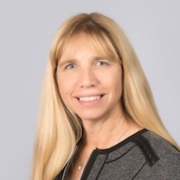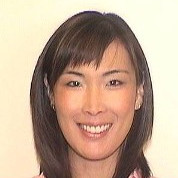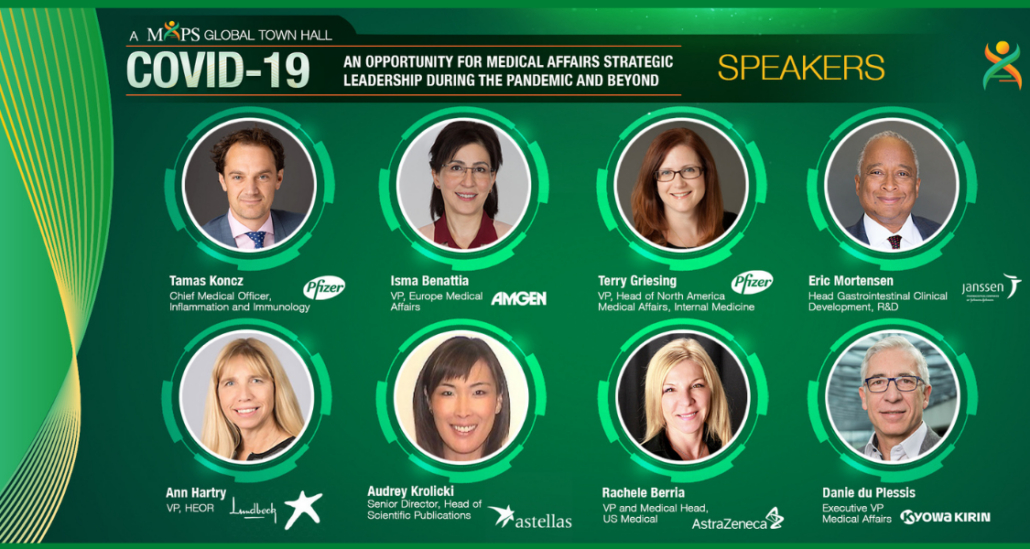The MAPS Global Town Hall on July 21, 2020 focused on the challenges arising from the global COVID-19 pandemic and the emerging opportunity for Medical Affairs to provide strategic leadership. In his opening remarks, Tamas Koncz, MD, MSc, PhD, Chief Medical Officer for Inflammation and Immunology at Pfizer, identified Evidence Generation and Dissemination as key domains within Medical Affairs to guide healthcare decision-makers. With the unique opportunity to engage in meaningful and substantial peer-to-peer relationships with healthcare professionals, Medical Affairs colleagues have a responsibility to ensure the safe and effective use of medicines, vaccines and medical devices, and are also uniquely positioned to bring actionable insights from HCPs back to the Medical Affairs, R&D and other functions. The following two talks and Q&A further explored the MA role within this ecosystem of challenge and opportunity.
Evidence Generation: Ensuring Speed and Quality During Rapid Decision-making

Ann Harty, PhD, Vice President, Value Evidence at Lundbeck
Ann explored ways in which Medical Affairs can promote science that is both “fast and good,” suggesting that real-world evidence can be leveraged toward this goal, and that by being realistic, prepared and knowledgeable, Medical Affairs can help ensure speed and quality of evidence generation.
Evidence Dissemination: The New World of Publications and Virtual Congresses

Audrey Suh Krolicki, PharmD, Senior Director, Head of Scientific Publications at Astellas
Audrey discussed the very timely topic of pre-print, pre-peer-review medical literature in a climate of expedited evidence dissemination, suggesting that the most important condition of good Evidence Dissemination is in fact good Evidence Generation. Audrey also addressed virtual congresses, proposing that by being more flexible, more proactive and finding ways to engage attendees online, meaningful scientific exchange is possible and certain aspects can even be improved in a virtual format. The future of congresses will likely emerge as a hybrid between in-person and virtual attendance.
Attendance and engagement highlighted the need for follow-on Global Town Halls to consider the role of other Medical Affairs domains including Capabilities Development, Insight Generation, Digital Innovation, and Field Medical Affairs, thus equipping MAPS members with knowledge, tools and inspiration to fulfill the opportunity for Medical Affairs strategic leadership during the COVID-19 pandemic and beyond.
Talks were followed by a Q&A session with a distinguished panel of senior Medical Affairs and Clinical Development leaders. Due to the pleasantly challenging situation of a large number of questions submitted by an engaged audience, panelists were not able to provide real-time answers to all questions, and instead offer their insights to questions submitted during the Town Hall, as follows.
Q&A
What is the most pressing challenge for Medical Affairs during the COVID-19 pandemic?
Accessibility of HCPs as many were redirected to help with the pandemic apart from not allowing any face to face visits. In some cases, patients were not able to receive their chronic medication as many clinics, hospitals and practices were only open for urgent cases. Alternative ways, for example treatment at home were explored.
We also believe that medical affairs, as the conveyor of fair and balanced on our medicines to ensure their safe and effective use has never been more important given the Covid-related limitations for doctors and patients and the general confusion of the public with regards to medicines and vaccines.
How has COVID-19 created new ways of working in MA that increase speed and confidence? How will be doing things differently as a result of these learnings?
COVID has expedited the digital journey that many companies are on in any case. Face to face meetings were replaced by virtual interactions for many HCPs and has opened the discussion about the efficiency of continuation of these virtual interactions, which is also environmentally more friendly. Although nothing can replace human interaction, we need to remember that a high percentage of HCPs are now so-called digital natives and quite used to virtual channels.
Many companies have responded in a robust, rapid and agile way. For example, some companies quickly adapted processes to review Medical Education Grants and Independent Research Grants related to COVID-19 research including requests for study drug(s). Additionally, where appropriate, study protocols were adapted to enable the virtual collection of data from study participants. Many companies mobilized quickly and moved from in-person visits to virtual engagements utilizing phone, WebEx, Zoom and other channels. Companies rapidly reviewed and approved new medical content and material which would enhance virtual engagements.
What are the expectations of Field teams, MSLs and payer liaisons as we continue to navigate through the pandemic?
We will need to be comfortable with discomfort and new ways of working. Interactions are likely to be a hybrid of face to face meetings and virtual interactions. Now more than ever we should focus on the needs of our stakeholders and understand how we can partner in the best possible way to continue with scientific exchange which should ultimately benefit patients.
Publications
What should we do if we have already used/cited a peer reviewed article that eventually was retracted from a magazine/journal?
We would suggest contacting the magazine/journal directly, inform them about the situation to determine the best course of action.
How do you approach authorship when you and/or internal colleagues at your company materially participated in work that will be peer-reviewed? Essentially, do you consider it acceptable to be an author when you work for the sponsor and/or for a commercial, for-profit entity?
Authorship should be determined based on ICMJE criteria. Specifically, those who provide substantial contributions to the conception or design of the work; or the acquisition, analysis, or interpretation of data for the work. Therefore, it is very common for employees of the sponsor company (such as study lead and statistician) to qualify for authorship. Internal (employees) and external (investigators) authors should be treated equally during the development of publication. Authorship is not about who you are, but rather what you did!
Considering the expanded reach of preprints, do the panelists believe that key clinical trial data (perhaps topline) could be made available on such platforms in the future?
Preprints servers have minimum requirements in order to post – so a manuscript with only topline results will not meet the criteria to allow for posting. In general, I think that use of preprints will be an evolving area that will require discussion with legal and E&C stakeholders within each organization.
MSL and HCP Interactions
What has been the response of HCPs to virtual meeting requests?
The overwhelming response has been positive. Many HCPs reported feeling supported as the initial virtual interactions was about checking in and exploring how we could add value, rather than a mindset of getting a specific message across. Those colleagues who already have business relationships found it easier than those new in a specific region or therapeutic area. HCPs are thankful for the medical professionalism demonstrated and appreciate the ability to engage virtually.
Can anyone share insights generated in how MSLs may better and fully engage HCPs during virtual 1:1 interactions?
We truly believe that the mindset of true scientific exchange is key. Listening skills might be more important than presentation skills. Also, take the time to understand the value of video calls rather than only audio calls, learn how to look into the camera and consider the light behind you. Being able to have a scientific conversation will be more engaging than wanting to share your screen to run through several slides. Companies should consider a refresh or new capabilities training on virtual engagements – a focus on how to present oneself in a virtual setting, navigating the meeting features of platform such as Zoom and WebEx, use of content and facilitation of discussion as well as listening skills and collecting insights to further enhance future engagements.
What measures are being used to demonstrate impact delivered by field teams?
We are continuing to use existing metrics while continuing to evaluate the return of engagements and qualitatively the robustness of the engagements. The quality of the insights, and how we assess the quality and whether the insights are actionable are very important.
Has there been a virtual platform for MSL/HCP interaction that is universally effective across different countries?
Many people are using Veeva Engage. We have also heard that it might not be the platform the HCPs are most familiar with. A true stakeholder mindset would mean that we will use the platform that is most convenient for our stakeholders, which may of course pose some difficulty in a company who usually have only one or two platforms.
Any thoughts on avoiding Zoom fatigue if showing too much data and not having a conversation?
Don’t do it! As we said above, conversation is much more valuable than a slide deck. Use slides sparingly to make a point and then stop sharing again to explore questions, comments, concerns. Focus on having a discussion and listening to the HCP. Only use content when needed to make or highlight an important data point or information.
When we want to shift a Medical program to virtual or online platforms, sometimes we meet challenges especially with HCP who are not “technology literate” — how do we handle technology literacy challenges with HCPs?
The challenge is to have a platform that is really easy to use. And patience to help teach them. A customer centric approach by companies would be to enable multiple platforms to increase the chances that HCPs are familiar and able to access the platform.
What are your thoughts about virtual medical affairs/MI booths? For those that have done them, can you share your experiences? Are there any best practices?
To ensure our information gets seen in the sea of presentations at conferences, we organize webinars that provide more time and context to discuss data and to address questions. We invite all physicians and KOLs to attend.
Have you changed your lead time for congresses at this time?
We have been making an effort to try and work as much in advance as possible. However, there are limitations to this when we require guidance from the congresses.
Any thoughts on enhanced enduring materials for virtual presentations considering lower attendance by HCPs to virtual congresses?
Good quality content with a good engaging presenter will go a long way to keep HCPs engaged. Please don’t read the slides!
Can you please discuss best practices for Key Opinion Leader (KOL) interactions in the virtual scientific congresses environment?
In the new world, best practice might remain 1:1 conversation and might need to shift away from a congress environment, whether virtual or face to face.
How can MA ensure virtual booth attendees are HCPs (not competitors)?
You can’t, just like you really can’t do it at a face to face meeting. In any case, what would you want to hide from the competitors unless it is late breaking news that is not already in the public domain?
What trends are you seeing at virtual congresses in terms of HCP engagement with medical content? Is there sufficient engagement, or is it very limited?
Our understanding is that it is quite variable. We do however know about webinars done by companies, distinct from virtual conference, where hundreds of HCPs connected and remained online.



